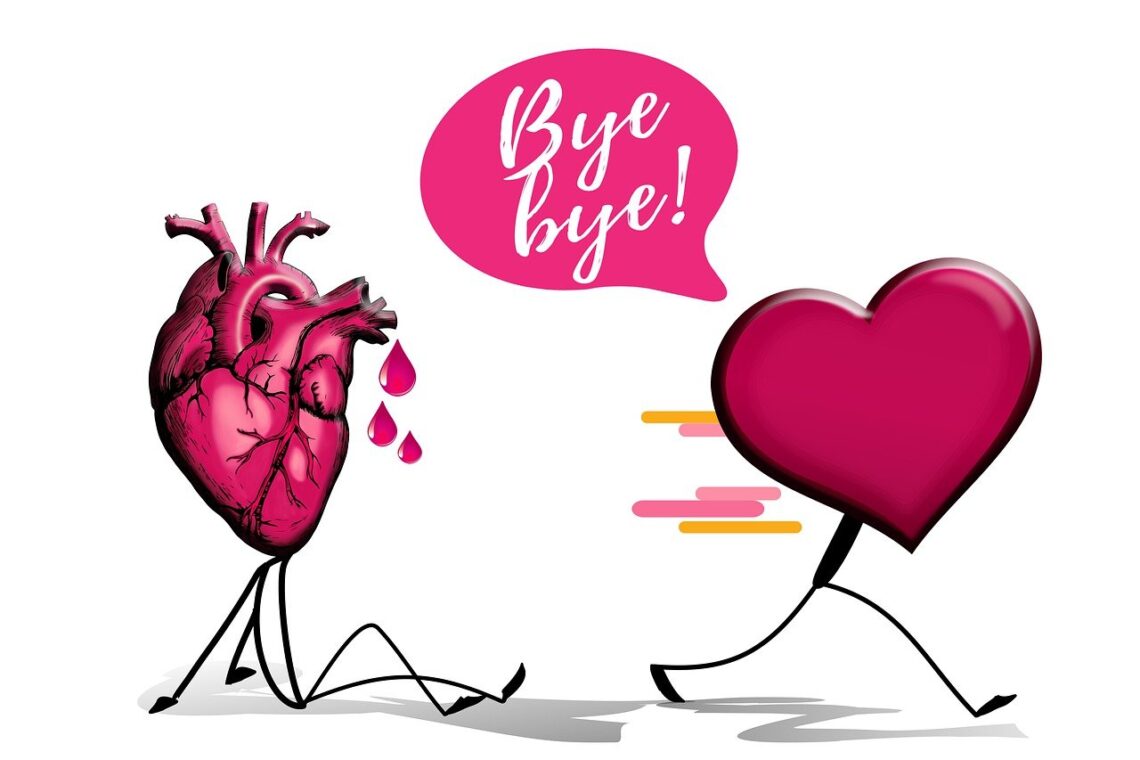
The Dark Side of Love: Coping with Heartbreak and Loss
Heartbreak and loss – two words that evoke a range of emotions in anyone who has experienced the dark side of love. The pain, the hurt, and the emptiness can be overwhelming, leaving one feeling lost and alone.
Love can be a beautiful thing, but when it ends, it can be devastating. The end of a relationship—a breakup—can trigger a wide range of emotions, from anger to depression. Coping with the dark side of love can be a challenge, but it is a challenge that must be faced head-on.
In today’s blog, We will explore the brutal truth about heartbreak and loss, society’s unrealistic expectations of love and relationships, the importance of coping mechanisms, coping strategies for heartbreak, real stories of individuals who have overcome heartbreak, and expert advice on moving forward.
Let’s explore the dark side of love and what happens when things go wrong.
The Brutal Truth About Heartbreak and Loss
Heartbreak and loss can be all-consuming and overwhelming. It can feel like your world is falling apart, and you are left with a deep sense of sadness, anger, and betrayal.
It’s easy to feel like the world is against us like we’re never going to find love again, but it’s important to remember that we’re not alone in our pain.
When we love, we open ourselves up to vulnerability and the possibility of getting hurt. We invest time, energy, and emotions into someone, only to have it all come crashing down when the relationship ends.
The truth is, heartbreak and loss are painful and difficult to deal with, but they are also a natural part of life. It is essential to acknowledge and accept these feelings rather than push them aside, as they are an integral part of the healing process.
Society’s Unrealistic Expectations of Love and Relationships
Society often portrays love and relationships as the ultimate sources of happiness and fulfillment. We are bombarded with images of happy couples, grand gestures of love, and the idea that finding the “perfect” partner will solve all our problems. This can create unrealistic expectations and put immense pressure on individuals to find the “one” and maintain a picture-perfect relationship.
Understanding heartbreaks
1. The Science Behind the Pain
Heartbreak and loss are universal human experiences that can be incredibly painful and difficult to navigate. While it may seem like an emotional experience, there is actually science behind the pain that comes with heartbreak.
When we experience a breakup or the loss of a loved one, our brains release hormones like cortisol and adrenaline that trigger our stress response. This can lead to physical symptoms like chest pain, headaches, and difficulty sleeping.
2. Types of Heartbreak
There are several types of heartbreak that people can experience, including romantic breakups, the death of a loved one, and the loss of a friendship or pet. Each type of heartbreak can have its own unique challenges and grieving process.
3. The Psychological and emotional effects
Heartbreak and loss can have a profound impact on our mental and emotional well-being. It is not uncommon to experience feelings of sadness, anger, anxiety, and even depression.
The grieving process can be long and difficult, and it is important to seek support from friends, family, or a mental health professional.
Coping Strategies for Heartbreak
Heartbreak is a difficult experience that affects people in different ways. However, it is important to acknowledge that it is a normal human experience that many people go through.
If you have recently experienced heartbreak and are struggling to cope, it is important to take care of yourself and seek support.
Here are some coping strategies that may help you through this difficult time.
1. Self-Care: Mindfulness, exercise, and therapy
Mindfulness practices can help you become more aware of your thoughts and feelings and help you stay present in the moment. Mindfulness can also help you manage stress and anxiety, and improve your overall well-being.
Exercise is another effective coping strategy that can help you manage stress and improve your mood. Exercise releases endorphins, which can help improve your mood and reduce feelings of depression and anxiety.
Therapy is another helpful option for coping with heartbreak. Talking to a therapist can provide you with a safe space to process your emotions and gain insight into your experiences.
A therapist can also help you develop coping skills to manage difficult emotions and navigate the healing process.
2. Moving on to Forgiveness, new passions, and rebuilding self-esteem
Moving on from heartbreak can be challenging, but it is possible. One of the first steps to moving on is forgiveness. Forgiveness is not about excusing someone’s behavior but rather about freeing yourself from negative emotions such as anger and resentment.
Finding new passions can also help you move forward from heartbreak. Engaging in activities that you enjoy or trying something new can help you discover new interests and focus on positive experiences.
Rebuilding self-esteem is also an important part of moving forward from heartbreak. This involves recognizing your worth and taking steps to build your confidence and self-assurance. This could include engaging in positive self-talk, practicing self-care, or seeking validation from supportive friends and family members.
Overcoming Heartbreak and Loss
Heartbreak and loss can be some of the most painful experiences we face in life. Whether it’s a breakup, the loss of a loved one, or a shattered dream, the dark side of love can leave us feeling lost, alone, and unsure of how to move forward.
However, it’s important to remember that healing is possible and that many people have found ways to move forward and find happiness again.
Real Stories of Individuals
There is no one-size-fits-all approach to coping with heartbreak and loss, and everyone’s journey to healing is unique. It can be helpful to hear real stories from individuals who have overcome similar struggles and emerged stronger on the other side.
Here are some of the Real Stories of Individuals to serve as a source of inspiration and hope.
One such famous story is that of J.K. Rowling, the famous author of the Harry Potter series. Rowling’s mother passed away after a long battle with multiple sclerosis, and she found solace in writing the Harry Potter books. Through her grief, she channeled her pain into something positive and created a beloved series that has touched the lives of millions.
Another example is Michelle Obama, the former First Lady of the United States, who has spoken openly about the challenges she faced during her marriage to former President Barack Obama.
In her memoir “Becoming,” she writes about the difficulties of balancing her personal life with her public role and how she coped with the challenges that came with it.
Jessica experienced multiple miscarriages before finally giving birth to a healthy baby. While the experience was incredibly difficult and took a toll on her mental health, she found comfort in talking to others who had experienced similar losses and seeking therapy.
Today, she is able to enjoy motherhood and is an advocate for breaking the stigma surrounding pregnancy loss.
Expert Advice on Moving Forward
While every individual’s journey to healing will be different, Moving forward after heartbreak and loss can be a challenging journey, but there are several things you can do to help yourself. Here are some expert tips on how to move forward
1) Allow yourself to feel:
It’s important to acknowledge and process your emotions rather than suppressing them. Give yourself permission to feel and express your emotions in a healthy way.
2) Practice self-care:
Taking care of yourself physically, mentally, and emotionally is crucial in the healing process. Engage in activities that bring you joy, such as hobbies, exercise, or spending time with loved ones.
3) Seek support:
It’s important to have a support system of people who can listen and offer comfort during this difficult time. This can include friends, family members, or a therapist.
4) Reflect and learn:
Reflect on the experience and what you can learn from it. This can help you grow and move forward in a positive way.
5) Set boundaries:
It’s important to set boundaries for yourself and others to protect your emotional well-being.
6) Take things one day at a time:
Healing is a process, and it’s important to be patient and take things one day at a time.
There are a variety of resources available for those seeking to heal from heartbreak and loss. Books, podcasts, and support groups can offer comfort and guidance during this difficult time.
Some of our personal recommendations in books are “Man’s Search for Meaning” by Viktor Frankl, The Art of Losing” by Kevin Young, and “The Year of Magical Thinking” by Joan Didion, which offer insights into the human experience of grief and loss.
Podcasts like “Terrible, Thanks for Asking” and “Grief Out Loud” provide a space for people to share their stories of loss and connect with others who are going through similar experiences.
Conclusion
Experiencing heartbreak and loss can be an incredibly challenging and painful journey, delving into the depths of our emotions. The dark side of love reminds us of our vulnerability and the profound impact relationships can have on our lives.
It is important to acknowledge and honor the pain we feel, allowing ourselves to grieve and heal at our own pace. Surrounding ourselves with support, practicing self-care, and seeking professional help when needed can aid in the coping process.
Take the time to nurture yourself, practicing self-care and self-compassion. Remember, healing takes time, and It’s okay to take as much time as you need to heal and find peace.
Trust that with each passing day, you are growing stronger, wiser, and closer to finding renewed joy and love in your life. Keep your chin up, my friend, there’s a whole world of love waiting for you.. .


You May Also Like

Swipe Right on Sanity: Beating Dating App Burnout and Finding Love Again
23 July 2025
The Single Girl’s Guide to Loving Valentine’s Day: Celebrate Yourself!
11 February 2025